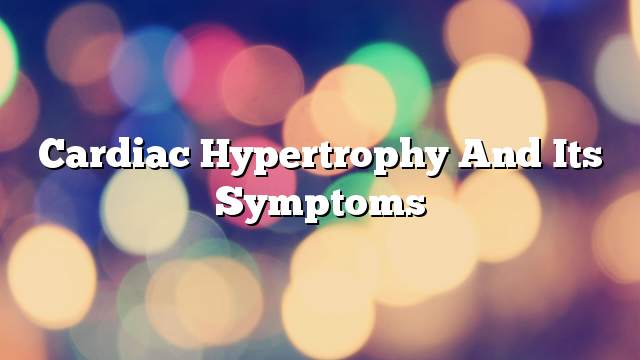Cardiac hypertrophy
Cardiac hypertrophy, or “enlarged heart,” is a medical term used to describe the heart containing enlarged circles or thick walls. This means that the size of the heart chambers exceeds the normal size, with the thickening of the lining of the heart muscle wall, In the efficiency of the heart and pumping blood throughout the body in the quantity and time required to perform normal vital functions.
Symptoms of heart enlargement
The heart is the result of any physiological or satisfactory condition; where the physiological condition occurs in pregnant women and athletes with heart hypertrophy without the appearance of heart disease, and the condition occurs when the heart can not pump an amount of oxidized blood to the body, and symptoms of heart enlargement:
- Weight gain, ie, obesity, plus increased abdominal circumference.
- Weakness and general fatigue, swollen legs, and problems with thyroid gland.
- Shortness of breath, persistent cough, in addition to chest pain.
- Edema; ie, the formation of fluids within the body.
- Paleness of the body, increased palpitations of the heart.
In order to control the symptoms of heart enlargement, the following should be taken into account: eating a balanced healthy diet with low salts, relieving excess weight, quitting smoking, avoiding stress and anxiety, and drinking six to eight glasses of water daily.
Causes of enlarged heart
- High blood pressure, heartbeat frequency.
- High pulmonary pressure, and anemia.
- Coronary artery disease, and hypertrophic cardiomyopathy.
- Genetic disorders.
- Viral infections, and kidney failure.
- Drink alcohol, drug abuse and cocaine.
- pregnancy period.
- AIDS.
- Kidney diseases such as dialysis.
Complications of heart enlargement
- Heart attacks, coronary artery disease, and congenital heart disease.
- Hypertension.
- Heart failure leading to death.
- Obesity; any excess obesity.
Preventing heart enlargement
- Weight loss, exercise daily and regularly.
- Stay away from unhealthy food and eat balanced food.
- Avoid nervousness, tension and anxiety.
- Do not eat alcoholic beverages and derivatives, and stay away from smoking.
Diagnosis and treatment of heart enlargement
Cardiac diagnosis is performed through many procedures such as: clinical examination, cardiac catheterization, ECG, magnetic resonance imaging (MRI), x-ray imaging, CT, blood pressure measurement, Treatment is done by treating the main cause of inflation, controlling blood pressure and muscle efficiency in blood pumping, performing heart transplant surgery, transplanting a device known as a heart regulator, or taking medications such as diuretics, blood pressure medications and anticoagulants.
